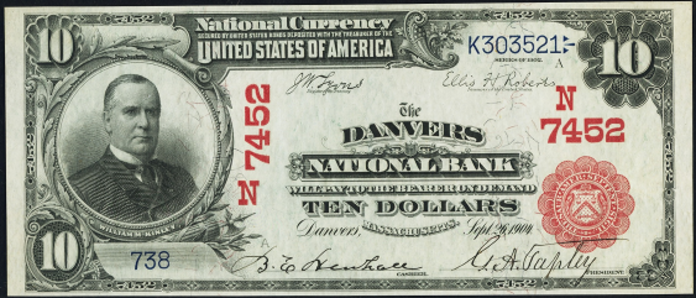Ten Dollar Notes › Nationals › 1902 Ten Dollar National Bank Notes › South Dakota Charters › 1902 $10 Woonsocket South Dakota First National Bank
Get Value Now
| Item | Info |
|---|---|
| Series | 1902 |
| Charter | #5946 First National Bank of Woonsocket, South Dakota |
| Year Chartered | 1901, 412 Banks Chartered |
| City Info | Woonsocket is a city in Sanborn County, South Dakota, United States. The population was 655 at the 2010 census. It is the county seat of Sanborn County. Woonsocket was developed in 1883 as a railroad town because of its location at the junction on the Chicago, Milwaukee and Saint Paul Railroad. C.H. Prior, the superintendent of the railroad, named the town Woonsocket after his home town of Woonsocket, Rhode Island. The town was incorporated in 1888. Source: Wikipedia |
| Similar Cities | If your note doesn't match try: 1. Woonsocket, Rhode Island - Citizens National Bank 2. Woonsocket, Rhode Island - Woonsocket National Bank 3. Woonsocket, Rhode Island - First National Bank 4. Woonsocket, Rhode Island - National Union Bank 5. Woonsocket, Rhode Island - Producers National Bank 6. Woonsocket, Rhode Island - National Globe Bank |
| Seal Varieties | Red, Blue |
| See Also | If your note doesn't match try: 1. 1907 $10 Gold Certificate 2. 1901 $10 Legal Tender 3. 1908 $10 Silver Certificates |
| Other Info | 1. Value depends on notes known for charter, condition and market demand. |
| Neat Fact | Portrait of President William McKinley. |
No Obligations Offers and Appraisals
Please submit a good photo or scan. It will be identified and evaluated. Understand there may be subtle differences between the image you see above and your note. Signatures, design, markings and note condition will determine the offer price. Notes in Uncirculated or better condition receive the best offers.
Appraisals can be estimated for wholesale and retail prices. Wholesale is what dealers typically pay. Retail is what a collector might pay. Retail is slightly higher in most cases.
Please visit this page for USA Paper Money Reference. Do not treat this page as a reference guide, it is for appraisal and acquisition purposes only.
